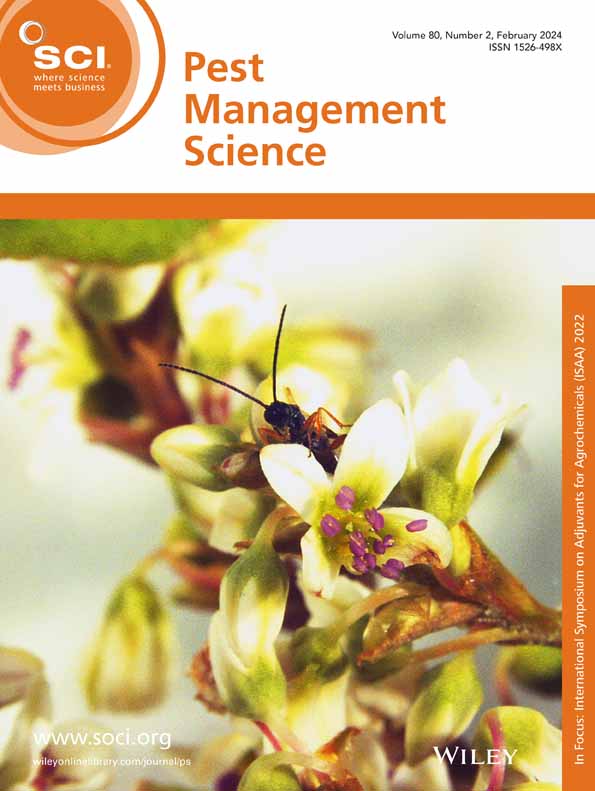生物胺调节秋粘虫的同类行为
IF 3.8
1区 农林科学
Q1 AGRONOMY
引用次数: 0
摘要
同类相食,被定义为同一物种的另一个个体吞食另一个个体,是在各种动物群体中普遍存在的现象,特别是在秋粘虫(Spodoptera frugiperda)的幼虫中。这些幼虫在特定的环境条件下表现出同类相食的倾向。结果本研究表明,在一、二龄阶段很少观察到同类相食的现象。在5龄和6龄幼虫中,同类相食的比例最高,从4龄到5龄有明显的增加趋势。饥饿和高密度饲养条件是显著提高同类相食频率的一些因素。在被检测的生物胺中,饥饿和拥挤条件下,只有章鱼胺及其限速酶基因TβH的表达显著升高。此外,用章鱼胺(一种神经活性化合物)治疗,大大增加了五龄幼虫自相残杀的频率。相反,补充酚妥拉明(一种章鱼胺受体拮抗剂)可以有效抑制饥饿诱导的同类相食。结论章鱼胺是水蚤同类相食行为的重要媒介。这一发现可能为开发以行为调节为目标的新型害虫防治策略提供基础。©2025化学工业协会。本文章由计算机程序翻译,如有差异,请以英文原文为准。
Biogenic amines modulate cannibalistic behaviors in the fall armyworm, Spodoptera frugiperda
BACKGROUNDCannibalism, defined as the ingestion of an individual by another individual from the same species, is a phenomenon prevalent across various animal groups, particularly among the larvae of the fall armyworm, Spodoptera frugiperda . These larvae exhibit cannibalistic tendencies under specific environmental conditions.RESULTSThis study demonstrates that cannibalism is rarely observed during the first‐ and second‐instar stages in S. frugiperda . The highest proportion of cannibalism was recorded among fifth‐ and sixth‐instar larvae, with a clear increasing trend observed from the fourth‐ to fifth‐instar stages. Starvation and high‐density rearing conditions are some factors that significantly enhance the frequency of cannibalism. Among the biogenic amines tested, only octopamine and the expression of its rate‐limiting enzyme gene TβH were significantly elevated under starvation and crowded conditions. Furthermore, treatment with octopamine, a neuroactive compound, substantially increased the frequency of cannibalistic attacks in the fifth‐instar larvae. Conversely, supplementation with phentolamine, an octopamine receptor antagonist, effectively suppressed starvation‐induced cannibalism.CONCLUSIONThese findings indicate that octopamine is a critical mediator of cannibalistic behavior in S. frugiperda . This insight may offer a foundation for developing novel pest control strategies targeting behavioral modulation in S. frugiperda . © 2025 Society of Chemical Industry.
求助全文
通过发布文献求助,成功后即可免费获取论文全文。
去求助
来源期刊

Pest Management Science
农林科学-昆虫学
CiteScore
7.90
自引率
9.80%
发文量
553
审稿时长
4.8 months
期刊介绍:
Pest Management Science is the international journal of research and development in crop protection and pest control. Since its launch in 1970, the journal has become the premier forum for papers on the discovery, application, and impact on the environment of products and strategies designed for pest management.
Published for SCI by John Wiley & Sons Ltd.
 求助内容:
求助内容: 应助结果提醒方式:
应助结果提醒方式:


